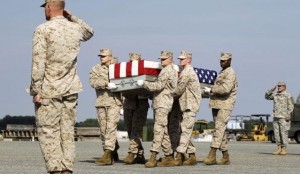
U.S. military indifference to Afghan sex abuse led boy to kill Marines, suit claims
A lawsuit charges that the U.S. military’s indifference to the crime of Afghanistan officials sexually abusing boys led to the killings of three Marines in 2012 by the youthful companion of a corrupt Afghan police chief.
Despite warnings that the chief, Sarwan Jan, and his boy entourage should be expelled from Forward Operating Base Delhi, Marine Corps commanders let him stay. On Aug. 10, one of his “tea boys” walked into the base gym and gunned down the three Marines, including Lance Cpl. Gregory Buckley Jr. of Long Island, whose parents are fighting out a lawsuit in U.S. District Court.
“There was no investigation or scrutiny into, or monitoring of, Jan or the unknown boys and young men he brought onto FOB Delhi,” states the lawsuit, filed by New York lawyer Michael J. Bowe, who took the case pro bono.
Mr. Bowe told The Washington Times, “Jan never should have been there. We believe these abuses contributed to Greg’s death because aligning our troops with those committing these horrific acts made our troops targets and because in looking the other way commanders failed to maintain a level of control over the base necessary for safety.”
A culture of high-ranking Afghan police, politicians and warlords routinely raping boys has been the focus of war stories since the 2001 U.S.-led invasion.
An article in Monday’s editions of The New York Times, posted online Sunday, has placed new emphasis on the debauchery by pointing out that U.S. commanders generally ignore the practice, even if the crimes happen on American bases.
In fact, two Green Berets were punished by their Army superiors because they physically accosted an Afghan local police leader for raping a boy and beating his mother. The Green Beret A-team leader chose to leave the Army. The Army has selected his sergeant, Charles Martland, for involuntary separation because of the reprimand.
Army Gen. John F. Campbell, the top U.S. commander in Afghanistan, issued a statement Tuesday saying there is no official policy to look the other way.
He said he personally spoke with Afghan President Ashraf Ghani. “He made it clear to me that the Afghan government will not tolerate the abuse of its children, or any of its people, and will thoroughly investigate all allegations and administer justice appropriately,” the four-star general said.
But an Army veteran of several tours in Afghanistan said senior commanders almost always told officers to not make an issue of witnessed abuse.
“Sure, there is nothing that precludes a service member from telling the chain of command, although one caveat,” the soldier told The Washington Times. “The chain of command usually responds with ‘that is not our business.’ Although there is nothing precluding anyone from reporting it, typically a blind eye is turned by most senior officers, and it is viewed almost as a cultural difference rather than a human rights violation.”
In the Buckley killing, Marine commanders allowed Jan, a notorious police chief, to set up shop at base Delhi with his boys. They arrived at a time when insider attacks, known as “green on blue,” were happening at an alarming rate as the enemy persuaded Afghans to turn on Americans and kill them.
“My son said that his officers told him to look the other way because it’s their culture,” Gregory Buckley Sr. told The New York Times. “‘At night, we can hear them screaming, but we’re not allowed to do anything about it,’” Mr. Buckley recalled his son saying.
Jan was expelled previously from an Afghan village, Now Zad, because of corruption and for fear that he collaborated with the enemy Taliban.
A Marine intelligence officer at the time, Maj. Jason Brezler, sent an email dossier to base Delhi in 2012 outlining Jan’s shady past. But commanders allowed him to stay.




